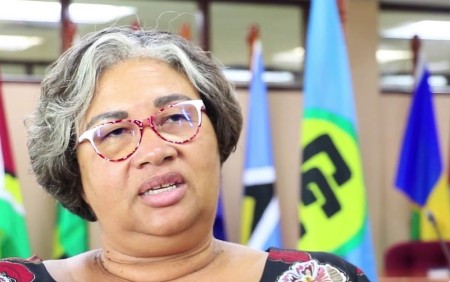PORT OF SPAIN, Trinidad and Tobago – There have been no confirmed cases of Monkeypox in the Caribbean thus far, Executive Director of the Caribbean Public Health Agency (CARPHA) Dr. Joy St. John said on Friday.
 CARPHA Executive Director Dr. Joy St. JohnHowever, she cautioned that the risk of the spread to the region is likely as travel returns to pre-COVID-19 pandemic levels.
CARPHA Executive Director Dr. Joy St. JohnHowever, she cautioned that the risk of the spread to the region is likely as travel returns to pre-COVID-19 pandemic levels.
“It is therefore important that CARPHA Member States raise awareness in frontline health workers and be on the alert for possible importation of cases so they can initiate a quick public health response,” she said.
According to the latest report from the World Health Organization (WHO), the count of confirmed cases of Monkeypox has passed 700 across Europe, Australia, North America, South America, and the Middle East, where the virus is not endemic.
Monkeypox, which was first identified in 1970, is a rare viral zoonotic infection transmitted from animals to humans, that usually does not spread easily between people. It is closely related to the virus that causes smallpox, and vaccination against smallpox has been shown to be protective against Monkeypox.
The disease spreads through close contact and is less clinically severe and infectious than smallpox.
However, CARPHA noted that the current outbreak is of concern in that it is occurring in non-endemic countries.
“CARPHA is monitoring the spread of the disease and the scientific understanding of prevention and control as it evolves over time,” the agency said in a statement on Friday.
“Should Monkeypox be identified in the region, CARPHA will test samples from suspected cases, monitor the spread and provide assistance to its Member States through the creation of tools for investigation and epidemiological monitoring, and personnel are prepared to respond in-country to assist in the investigation and control of a Monkeypox outbreak, should the need arise.”
CARPHA has signed an agreement with the US Centers for Disease Control and Prevention (CDC) to refer suspected samples from Member States for testing while the agency is in the process of procuring the necessary reagents to be able to implement molecular testing for Monkeypox (PCR).
“Results may be received between 10-14 days after the arrival of samples at CARPHA once referred to CDC. In the interim, a commercial kit, Monkeypox Virus (MPXV) Real Time PCR Kit (RUO) produced by BioPerfuctus Technologies is in transit and once received it will be verified for immediate use. If Member States have suspected cases, they should contact CARPHA for information on sending suspect samples,” the Trinidad-based agency said.
Dr Lisa Indar, CARPHA’s Director of Disease Surveillance Prevention and Control, has urged Member States to remain vigilant for the importation of viral or other infections and monitor in-country surveillance systems for increases in fever and rash illnesses.
Additionally, Member States have been advised to enhance surveillance and case investigation for Monkeypox, alert port health officials to be vigilant for possible cases entering the country, and develop and disseminate public education materials on Monkeypox.
Symptoms of Monkeypox include exhaustion, fever, headache, backache, muscle ache, chills, and swollen lymph nodes.
Dr. St. John has advised that persons should avoid having close contact with anyone who has symptoms, and should protect themselves by practicing good hand hygiene and avoiding skin-to-skin or face-to-face contact, including sexual contact, with anyone who has symptoms.


